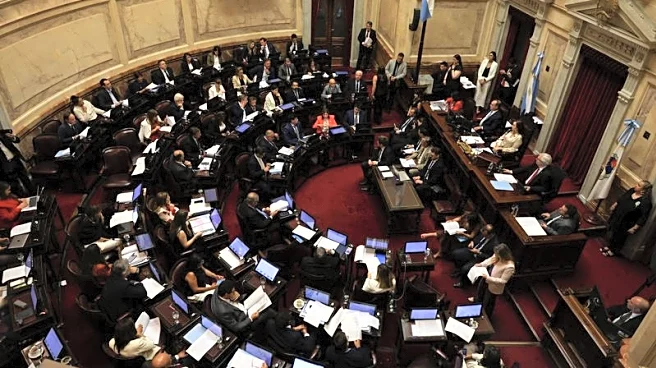What's Happening?
Rep. Frank Mrvan, D-Highland, emphasized the importance of the steel industry in Northwest Indiana during a visit to Carmeuse's Buffington campus in Gary. As vice-chairman of the Congressional Steel Caucus, Mrvan expressed his commitment to supporting local steelworkers and maintaining the vitality of the steel industry in the region. He highlighted the significance of Section 232 steel tariffs, which he believes are crucial for the economic strength and national security of the American steel industry. Mrvan met with Carmeuse employees, local union representatives, and city leaders to discuss how these tariffs could benefit the local steel industry. Carmeuse, a global manufacturer of lime and limestone products, plays a vital role in the steelmaking process, and its support for the steel industry was acknowledged by Mrvan. He urged continued hiring of local workers and maintaining a safe work environment as ways to support federal advocacy efforts.
Why It's Important?
The steel industry is a significant economic driver in Northwest Indiana, providing jobs and supporting local communities. The advocacy for Section 232 steel tariffs by Rep. Mrvan is aimed at protecting the industry from foreign competition and ensuring its continued growth. These tariffs are seen as a measure to prevent the dumping of subsidized steel into U.S. markets, which could undermine domestic production. By supporting these tariffs, Mrvan is working to safeguard the economic interests of the region and the livelihoods of steelworkers. The emphasis on local hiring and safe work environments further strengthens the community's economic resilience. The steel industry's health is vital not only for local economies but also for national security, as it is a key component in infrastructure and defense manufacturing.
What's Next?
Rep. Mrvan's continued advocacy for steel tariffs will likely involve further discussions with federal officials, including the U.S. Secretary of Commerce and the U.S. Trade Representative, to uphold these measures in trade negotiations. The focus will be on ensuring enforcement in trade politics to protect the industry from unfair practices. Local stakeholders, including Carmeuse and union representatives, are expected to continue their support for these efforts, emphasizing the importance of local employment and safe working conditions. The outcome of these advocacy efforts could influence future trade policies and impact the steel industry's competitive position in the global market.
Beyond the Headlines
The push for steel tariffs highlights broader issues of trade protectionism and its impact on domestic industries. While tariffs can bolster local production, they may also lead to increased costs for construction and manufacturing, affecting other sectors. The balance between protecting local industries and maintaining competitive pricing is a complex challenge. Additionally, the focus on local hiring and safe work environments reflects broader societal values of community support and worker welfare, which are essential for sustainable economic development.










